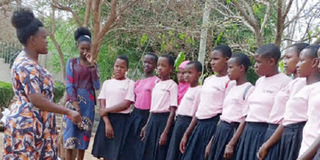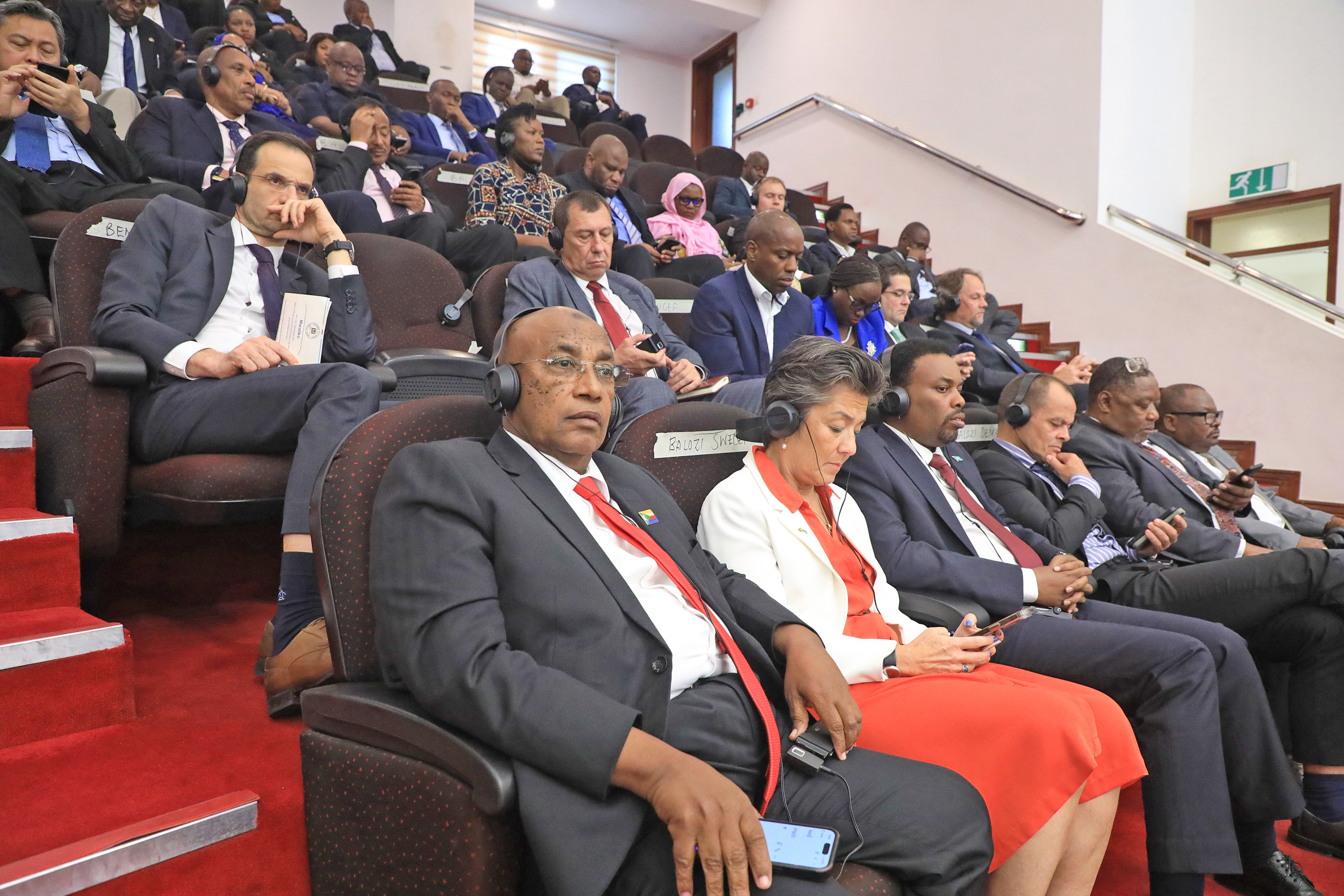Hurdles, setbacks in tackling child marriages in Maasai communities

Tanzania Education and Micro-Business Opportunity (Tembo) facilitator, Christine Sumayani, explains to students the importance of fulfilling their dreams for a brighter future.
PHOTO | ROSEMARY MIRONDO
What you need to know:
- Girls of school-going age in the Maasai community are married off secretly in Longido District because of deep-rooted bad cultures and gender inequality.
Longido. Fathers and bridegrooms of intended child brides in the Masaai community sometimes run away to Kenya to avoid the long arm of the law when they realise the police are about to arrest them for preparing for the marriage, according to Officer Commanding District (OCD) for Longido, Leah Nicolaus.
She told The Citizen that girls of school-going age are married off secretly in the district because of bad cultures and traditions.
“I am new in this district but am aware that my predecessors have arrested some parents, especially the fathers and intended husbands, for trying to marry off their teenage daughters,” she said.
She said the mothers are not happy with their husbands’ decisions and, therefore, decide to tip off the police. In many cases, she said, they escape arrest and flee to Kenya after learning the police were hunting them.
She said it was a huge challenge when girls of school-going age were forced to be married instead of going to school to realise their dreams.
“Mothers of the girls tip us off to the situation because they don’t want their daughters to be married off at a tender age,” she said.
According to the OCD, it was important to change people’s attitudes and perceptions towards early marriage, which requires public education and awareness about the dangers of child marriage, the laws in place, and more generally, the gender norms and stereotypes that perpetuate the practice.
Children, parents, and community leaders, including religious leaders, with a focus on boys and men, should be targeted in efforts to change attitudes about the status of girls and women in the community and should be active partners in community mobilisation to challenge child marriage and gender norms rooted in tradition.
Various communication techniques can be used to spread positive messages about gender equality and the value of girls in society.
According to a report by Save the Children, child marriage is often the result of entrenched gender inequality, making girls disproportionately affected by the practice.
Globally, the prevalence of child marriage among boys is just one-sixth that among girls.
Child marriage robs girls of their childhood and threatens their well-being.
Child marriage is a serious human rights violation and one of the most pressing development concerns in the world today. Commonly defined in international law as marriage under the age of 18, child marriage disproportionately and negatively affects girls, who are more likely to be married as children than boys.
Child marriage compromises girls’ dignity as they are often forced into marriage, usually at a very young age, when they do not have the maturity or are not given the freedom to consent to marriage.
It is steeped in harmful traditional norms and practices passed across generations, which has a debilitating impact on the lives of girls, their families, and society at large and perpetuates a generational cycle of poverty.
Apart from being a human rights violation, child marriage has grave consequences for girls’ sexual and reproductive health and often results in early pregnancies, with increased risks for young mothers and their children.
Child marriage denies girls their childhood and crucial education and employment opportunities. It makes them vulnerable to sexual and other forms of physical violence and abuse in a domestic setting.
Despite these adverse consequences, the practice persists with impunity.
This is a matter of grave concern, and it requires serious deliberation and action.
Given the situation, the director of the Loliondo-based Tanzania Education and Microfinance Opportunities (Tembo), Paulina Sumayani, said she has decided to advocate for education, especially for girls, to promote equality. They provide funds to enable girls to go to school.
According to her, the environment does not favour girls in the district; therefore, they are not taken to school, unlike the boy child. She noted that the girl child is married off immediately after they come of age so that the father can get cows.
“We have been creating awareness to make them understand that both boys and girls are equal. We educate them against Female Genital Mutilation (FGM), which is normally done to prepare the girl for marriage,” she said.
She noted, however, that while they work tirelessly to ensure the girls go to school, all their work is rubbished after they are married off during the holiday.
Given such circumstances, she said they have been working in collaboration with the gender desks in police stations to rescue the girls.
“We even provide school equipment like books and school uniforms to ensure the girls have everything necessary to attain education, but our efforts are pushed back by parents who marry off their girls when they close the school and go home for holidays,” she said.
She said their goal is to ensure the girls have an education from primary to university. “We have examples of a girl who attained division two in Form IV, but she was married off and got pregnant before she could join Form V. We are now awaiting her delivery to help her continue her education and realise her dreams of becoming a teacher,” she said.
Minister for Community and Development,Gender, Women, and Special Groups, Dr Dorothy Gwajima, was recently quoted saying during the climax of the International Day of the Girl Child that the government will continue investing in young girls because they are exposed to various forms of violence.
Statistics show that girls in the country have been going through various challenges, including sexual violence such as rape, FGM, and child marriage.
“The government will invest in liberating the female and male children, but we will invest more in the female child because the statistics show that girl children are the biggest victims of violence,” she said.
She gave an example of a report from the Tanzania Police Force on sexual violence, which shows that a total of 12,163 incidents of violence against children occurred, of which 2201 involved boys and 9,962 against girls.
“We need to strengthen efforts to end violence against young girls. The government has taken such an initiative by allowing teenage mothers to go back to school and continue with their studies. A total of 17,532 students returned to school in 2022,” she said.
According to the minister, between January and September this year, a total of 11,248 adolescent mothers returned to school, of whom 5,057 were primary students and 6,191 were secondary students.




